| Source (Hebrew) | Translation (English) |
|---|---|
וַהֲוָ֞הֿ בְיוֹמֵ֤י אַנטִיוֹכוֹס֙ מַלְכָּ֣א דְֿיָוָ֔ן מֶ֤לֶךְֿ רָבֿ֙ וְתַֿקִּ֣יףֿ הָוָ֔הֿ וְחָסִ֧ין בְשׇּׁלְטָנוּתֵֿ֛יהּ וְכׇֿל־מַלְכַֿיָ֖א יִשְׁתָּמְע֥וּן לֵֽיהּ׃ וְ֠הוּא כְּבַ֞שׁ מְדִֿינָ֤ן סַגִּיאָן֙ וֵמַלְכִֿ֣ין תַּקִּיפִֿ֔ין וְאַצְדִּ֣י בֵּרַנוּתְֿה֔וֹן וְהֵיכְֿלֵיה֖וֹן אוֹקִ֣ידֿ בְּנוּרָ֑א וְגִֿבָּרֵיה֖וֺן בֶאֱס֥וֹר אָסָֽר׃ וְ֠הוּא בְּנָ֞הֿ מְדִֿנְתָּ֤א רַבְּתָֿא֙ עַל־סְפַ֣ר יַמָּ֔א לְמֶהֱוֵֽי־לֵ֖יהּ לְבֵֿ֣יתֿ מַלְכֿוּ֑ וּקְרָ֥א לָ֛הּ מְדִֿינְתָּ֥א אַנְטוּכְֿיָ֖א עַל־שְׁמֵֽיהּ׃ וְאַף֮ בַּגְֿרִ֣יס תִּנְיָנֵיהּ֒ בְּנָ֞ה מְדִֿינְתָּ֤א אׇחְרָנְתָּא֙ לְקִבְֿלָ֔א וּקְרָֽא־לָ֖הּ בַּגְֿרִ֣יס עַל־שְׁמֵ֑יהּ וְכֵֿ֥ן שְׁמָהָתְֿה֖וֺן עַד־דְּנָֽא׃ בִּשְׁנַ֣תֿ עֶשְׂרִין֩ וּתְֿלַ֨תֿ שְׁנִ֜ין לְמַלְכֿוּתֵֿ֗יהּ הִ֠יא שְׁנַ֨תֿ מָאתָֿ֤ן וּתְֿלַֽתֿ־עָשָׂר֙ שְׁנִ֔ין לְבִֿנְיָ֖ן בֵּיתֿ־אֱלָהָ֣א דֵֿ֑ךְֿ שַׁוִ֣י אַנְפּ֔וֹהִי לְמֵסַ֖ק לִירוּשְׁלֵֽם׃ עָנֵ֨הֿ וְאָמַ֜ר לְהַדָּבְֿר֗וֹהִי הֲלָ֨א יְדַֿעְתּ֜וּן דִּ֣י אִיתַֿ֗י עַמָּ֨א יְהוּדָאֵ֤י דִי־בִירוּשְׁלֵם֙ לְדְֿאֱלָהָ֙נָא֙ אִנּ֣וּן מְקָרְבִֿ֔ין וְנִימוֹסָ֖נָא לָ֣א עָבְֿדִּ֑ין וְדָֿתֵֿי־מַלְכָּ֥א שָׁבְֿקִ֖ין לְמֶעֱבָּ֥ד דָּתֵֿיהֽוֹן׃ וְאַףֿ־אִנּ֣וּן מְסַבְּרִ֡ין לְיוֹמָא֩ תְּבָֿ֨ר מַלְכַֿיָּ֜א וְשִׁלְטוֹנַ֗יָּא וְאָמְרִין֩ אֵימָתַֿ֣י יִמְלֽוֹךְֿ־עָלָ֣נָא מַלֻכָּ֔נָא וְנִשְׁלוֹט֙ בְּיַמָּ֣א וּבְֿיַבֶּשְׁתָּ֔א וְכׇל־עַלְמָ֖א בִּידַֿ֣נָא יִתְֿמְסַָ֑ר לֵ֤יתֿ רְבוּת֙ לְמַלְכֿוּתָֿ֔א לְמִשְׁבַּ֥ק אִלֵ֖ין עַל־אַפֵּי־אַֽרְעָא׃ כְּעַ֞ן אָתֿוֹ֙ וְנִסַ֣ק עֲלֵיה֔וֹן וּנבַֿטֵּל֙ מִנְּה֔וֺן קִיָמָ֛א דִּיגְֿזָ֥ר לְה֖וֹן אֱלָהָה֑וֹן שַׁבְּתָֿ֥א יַרְחָ֖א וּמהִילוּתָֽֿא׃ ושְׁפַֿ֥ר פִּתְֿגָֿמָ֖א בְּעֵינֵ֣י רַבְֿרְבָֿנ֑וֹהִי וּבְֿעֵינֵ֖י כׇל־חֵילֽוֹהִי׃ |
It came to pass during the time of Antiochus king of Greece: he was a mighty and powerful ruler and his governance was strong, and all kings were obedient to him. He subdued many provinces, imprisoned powerful rulers, destroyed their citadels, set their palaces ablaze in fire, and imprisoned their warriors. He constructed a large city on the shore of the sea to serve as his royal residence, and he named it Antochia after his own name. His second-in-command Bagris also built another city opposite it, and he named it Bagris after his own name, and these are their names even now. In the twenty-third year of his reign – it being the two hundred and thirteenth year after the re-construction of the Temple of God – he set his face to go up to Jerusalem. He spoke up and said to his companions: “Don’t you know that there is a specific people among us – the Judeans who are in Jerusalem – who do not sacrifice to our gods or do our legislations, and abandon the laws of the king to observe their own laws? Not to mention they long for the day when rulers and authorities are shattered, and they say: ‘When will our own king rule over us? We will gain authority over sea and land, and all the world will be delivered into our hands!’ The majesty of the kingdom cannot permit these on the face of the earth! Now come and let us go up against them, and we will nullify from among them the covenant which their God decreed on them, Sabbath, new moon, and circumcision!” The proposal was pleasing in the eyes of his nobles and in the eyes of all his force. |
בָּ֣הּ שַׁעֲתָֿ֞א קָם֮ אַנטְיּוֹכֿ֣וֹס מַלְכָּא֒ וּשְׁלַ֖ח בְּנִיקָנ֣וֹר תִּנְיָנֵ֑יהּ בְּחֵ֤יל רַבֿ֙ וּבְֿעַ֣ם סַגִּ֔יא וְאָתָֿ֛א לְקַ֥רְתָּא דִֿיק֖וֹדֿ לִירוּשְׁלֵֽם׃ קְטַל־בָּהּ֙ קַטְלָ֣א סַגִּ֔יא וּבְנָ֥א פַֿרְכָֿ֖א בְּבֵֿ֣יתֿ מַקדְּשָׁ֑א בְּאַתְֿרָ֨א דִֿאָמָ֜ר אֱלָהָ֣ה יִשְֹרָאֵ֗ל לְעַבְד֙וֹהִי֙ נְבִֿיָאיָ֔הֿ תָּמָ֛ן אַשְׁרֵ֥י שְׁכִֿינְתֵּ֖יהּ לְעָלְמָֽא׃ בֵּ֤יהּ אַתְֿרָא֙ נְכַ֣סוּ בֵּ֣יהּ חֲזִירָ֔א וְאוֹבִֿ֥ילוּ מִדְּמֵ֖יהּ לַעֲזַרְתָּ֥א דְּקוּדְֿשָֽׁא׃ כׇּל־קֳבֵֿ֨ל דְּנָ֜א כְּדִֿ֣י שְׁמַ֗ע יוֹחָנָן֙ בַּ֣ר מַתִּתְֿיָ֔ה כַּהֲנָ֖א רַבָּ֑א דִּי־דְֿנָ֤א עוֹבָֿדָֿא֙ יִתְֿעַבֵּ֔דֿ יִתְֿמְלִ֨יא רְגַ֤ז וְחֵמָא֙ וּכְנֵ֣ס אַנְפּ֣וֹהִי יִשְׁתַּנִּ֔י יִתְֿמְלִ֣יךְֿ בְּלִבֵּ֔יהּ מָ֛ה דִֿי־יִכּ֥וּ לְמֶעֱבָֿ֖ד עַל־דְּנָֽא׃ בֶּאֿדַ֞יִן יוֹחָנָ֤ן בַּר־מַתִּתְֿיָה֙ עָבַד־לֵ֣יהּ חַרְבָּ֔א זְרָ֥תֿ תַּרְתֵּ֖ין אׇרְכָּ֑א פּוּתְֿיָה֙ זַרְתָּ֣א חֲדָ֔א תְּח֥וֹתֿ לְבֿוּשׁ֖וֹהִי עַטְפַֽֿא׃ לִירוּשְׁלֵ֣ם אָתָֿ֔א וְקָ֖ם בְּתַֿרְעֵ֣יהֿ מַלְכָּ֑א וּקְרָ֤א לְתַֿרְעַיָּא֙ וְאָמַ֣ר לְה֔וֹן אָנָא֙ יוֹחֲנָ֣ן בַּר־מַתִּתְֿיָ֔א אָתֵֿ֕יתִֿי לְמֵיעַ֖ל קֳדָם־נִיקָנֽוֹר׃ בֶּאֿדַ֨יִן עָלְלִ֜ין תַּרְעַיָּא֙ וּנְטוֹרַיָּ֔א וְאָמְרִ֣ין לֵ֔יהּ כַּהֲנָ֥א רַבָּ֛א דִּ֥י יְה֖וּדֿ קָאֵ֣ים בְּתַרְעָ֑א עָנֵ֧הֿ נִיקֽנ֛וֹר וְאָמַ֛ר לְה֖וֺן ע֧וֹל יְעֽוּל׃ אֱדַ֙יִן֙ יוֹחֲנָ֔ן הוּעַ֖ל קֳדָֿ֣ם נִיקָנ֑וֹר עָנֵ֣הֿ נִ֠יקָנוֹר וְאָמַ֨ר לְיוֹחֲנָ֜ן אַ֨נְתְּ־הוּא חַ֤דֿ מִן־מְרוֹדַֿיָּא֙ דִּי־מְרָ֣דֿוּ בְֿמַלְכָּ֔א וְלָ֥א בָֿעַיָ֖ן שְׁלָ֥ם מַלְכוּתֵֽֿיהּ׃ עָנֵ֥הֿ יוֹחֲנָ֛ן קֳדָֿ֥ם נִיקָנ֖וֹר וְאָמָ֑ר כְּעָן֙ אָתֵֿ֣יתִֿי קֳדָֿמָ֔ךְֿ דִּי־אַ֥נְתְּ צָבֵֿ֖י אָנָ֥א עָבֵֽֿידֿ׃ עָנֵ֣הֿ נִיקָנ֣וֹר וְאָמַ֣ר לְיוֹחֲנָ֡ן הֵ֣ן כְּמִצְבְּאִי֩ אַ֨נְתְּ עָבֵֿ֜ידֿ סַבֿ־חֲזִירָ֣א ׀ וּנְכ֣וֹס עַל־פַּרְכָ֗א וּלְבֿוֹשׁ֙ לְבֿוּשָׁ֣א דִֿימַלְכָּ֔א וּרְכַֿבֿ֙ עַל־סוּסְיָ֣א דְֿמַלְכָּ֔א וּכְֿחַ֛דֿ מִן־רְחִימֵ֥י מַלְכָּ֖א תֶּהֱוֵֽי׃ וּכְֿנֵימָ֥א פִֿתְֿגָֿמָ֖א הֲתִֿיבֵֿ֣יהּ יוֹחֲנָ֑ן מָרִ֞י אָנָֽא־דָֿחִ֣יל ׀ מִן־בְּנֵ֣י יִשְֹרָאֵ֗ל דִּלְמָ֣א יִשְׁמְע֞וּן דְּעָבַֿדִֿ֤יתֿ כֵּן֙ וְיִרְגְּמוּנַ֣נִי בְּאַבְֿנַיָּ֔א כְּעַ֞ן יִפְּק֧וּן כׇּל־אֱנָ֛שׁ מִן־קֳדָֿמָ֖ךְֿ דִּלְ֥מָא יְהוֹדְֿעֽוּן׃ אֱדַֿ֨יִן֨ נִיקָנ֔וֹר הַנְפַּ֖ק כׇּל־אֱנָ֥ש מִן־קֳדָמֽוֹהִי׃ כׇּל־קֳבֵֿ֣ל דְּנָ֡א בֵּ֣יהּ זִמְנָ֡א זְקַ֣ף יוֹחֲנָ֣ן בַר־מַתִּתְֿיָ֣הֿ עֵינ֣וֹהִי לִשְׁמֵ֣י מְרוֹמָ֡א וְסַדַּ֣ר צֵלוֹתֵיֿהּ֩ קֳדָֿ֨ם רִבּוֹן־עָלְמָ֝א וְאָמַ֗ר אֱלָהִי֙ וֵאֿלָהָ֣א דַֿאָבָֿהֲתַּ֔י אַבְֿרָהָ֥ם יִצְחָ֖ק וְיַעֲקֹֽבֿ׃ וְכֵֿ֖ן אָמָ֑ר לָא־כְֿעַ֤ן תִּמְסְרִנַּ֙נִי֙ בְּיַד֙ עָרְלָאָ֣הֿ הָדֵֿ֔ין דִּי־הֵ֣ן יִקְטְלִנַּ֔נִי יְהַ֤ךְֿ וְיִשְׁתַּבַּח֙ בְּבֵֿיתֿ֙ דָּגֿ֣וֺן טָעוּתֵֿ֔יהּ וְיֵאֿמַ֕ר טָעוּתִֿ֖י מְסַרְתֵּ֥יהּ בִּידִֽֿי׃ בַּ֣הּ שָׁעֲתָּ֗א פְּסַ֤ע עָל֙וֹהִי֙ פִּסְעִ֣ין תְּלָתָֿ֔א וּתְקַ֥ע חַרְבָּ֖א בְּלִבֵּ֑יהּ וּרְמָ֥א יָתֵֿ֛יהּ קְטִילָ֖א בַּעֲזַרְתָּ֥א דְֿקוּדֿשָֽׁא׃ קֳדָֿ֣ם ׀ אֱלָ֣הּ שְׁמַיָּ֗א עָנֵ֤הֿ יוֹחֲנָן֙ וְאָמַ֔ר לָא־תַֿשְׁוִ֤י עָלַי֙ חוֹבִ֔ין דִּ֥י קְטַלְתֵּ֖יהּ בְּקֻדְֿשָׁ֑א כְּעַ֗ן כֵּ֣ן תִּמְסַ֤ר כׇּל־עַמְמַ֙יָּא֙ דְּאָתֿ֣וֹ עִמֵּ֔יהּ לְאַעֲקָ֥א לִיה֖וּדֿ וּלִירוּשְׁלֵֽם׃ אֱדַ֜יִן נְפַֿ֨ק יוֹחֲנָ֤ן בַּר־מַתִּתְֿיָא֙ בְּיוֹמָ֣א דְֿנָ֔א וְאָגַֿ֥ח קְרָבָֿ֖א בְּעַמְמַיָּ֑א וּקְטַ֥ל בְּה֖וֹן קַטְלָ֥א סַגִּֽיא׃ מִנְיַן֙ קְטִילַיָּ֔א דִּ֥י קְטַ֖ל בְּיוֹמָ֣א דְֿנָ֑ח שְׁבַ֨ע מֵאָ֤ה וְשִׁבְֿעִין֙ וּתְֿרֵ֣ין אַלְפִֿ֔ין דְּהָו֥וֹ קָטְלִ֖ין אִלֵּ֥ין לְאִלֵּֽין׃ בְּמֵתָֿ֣בוּתֵ֔יהּ בְּנָ֥הֿ עַמּוּדָֿ֖א עַל־שְׁמֵ֑יהּ וּקְרָ֣א לֵ֔יהּ מַכְּבַֿ֖י קְטִ֥יל תַּקִּיפִֽֿין׃ |
At that time King Antiochus arose and dispatched Niqanor his second-in-command with a large army and numerous people, and he came to the burning city of Jerusalem. He killed many there, and he erected a shrine in the Holy House, on the spot where the God of Israel had told His servants the prophets: “there I will cause My Presence to dwell forever” — in that place they slaughtered a pig and brought some of its blood into the holy court. Thereupon, when Yoḥanan son of Matithyah the high priest heard about those deeds done, he was filled with anger and wrath, and he form of his face changed, and he took counsel in his heart about what to do about this. Presently Yoḥanan son of Matithyah made himself a sword two spans in length and one span in breadth, and under his clothing he wrapped it. To Jerusalem he came, and stood at the king’s gates, and called to the gatekeepers and guards and said: ‘I am Yoḥanan son of Matithya. I have come to enter before Niqanor. Presently the gatekeepers and guards entered and said to him: “The high priest of Judea is standing at the gate.” He answered and said to them: “Let him enter, let him enter!” Presently Yoḥanan was brought in before Niqanor. Niqanor spoke up and said to Yoḥanan: “Are you one of the rebels who have rebelled against the king and who do not seek the welfare of his kingdom?” Yoḥanan answered Niqanor and said: “I have now come before you — whaterver you desire I shall do.” Niqanor responded and said to Yoḥanan: “What, you seek my favor? Take a pig and sacrifice it on this shrine, and be clothed with a royal garment, and mounted on the king’s horses, and you will become like one of the friends of the king!” And as follows Yoḥanan returned a statement to him and said: “Sir, I am afraid of the children of Israel — lest they hear about what I have done, in which case they will stone me with stones! Now, lest they let them know!’ Presently Niqanor made everyone leave from before him. Thereupon, at that time Yoḥanan son of Matithyah lifted his eyes to the highest heaven and offered his prayer before the Master of the Universe, and he said: “My God and God of my ancestors Abraham, Isaac, and Jacob!” And then he said: “Do not deliver me into the hand of this uncircumcised one, for lest he put me to death and then go and offer praise in the temple of Dagon his idol, and say: “My idol has delivered him into my hand!” At that time he took three steps toward him and stabbed his sword into his heart, and then threw his corpse into the Temple. Before the God of Heaven Yoḥanan spoke up and said: “Do not place grievous sin upon me since I killed him in the Temple! Now, may You now deliver all the peoples who have come with him to lead astray Judea and Jerusalem!” Presently Yoḥanan went out on that very day, and he waged war against the nations, and he killed among them a great many. The number of the killed who were killed on that day amounted to 72,700, for they were killing each other. At his dwelling-place he built a pillar after his name and called it Maccabee, Killer of the Mighty. |
וּכְֿדִֿ֨י שְׁמָ֜ע אַנְטִיּוֹכֿ֣וֹס מַלְכָּ֗א דְּאִתְֿקְטִיל֙ נִיקָנ֣וֹר תִּנְיָנֵ֔יהּ עַ֥קַתֿ לֵ֖יהּ לַחְדָּ֑א וּשְׁלַח֙ לְהַיְתָֿיָּ֣א לֵ֔יהּ בַּגְֿרִ֥יס חַיָּיבָֿ֖א מַטְעֵ֥י עַמֵּֽיהּ׃ עָנֵהֿ אַנטִיּוֹכֿוֹס֩ וְאָמַ֨ר לְבַֿגְֿרִ֜יס הֲלָ֨א יְדַעְתָּ֜אה הֲלָ֣א שְׁמַ֗עתָּ בֵּ֤יתֿ יִשְׂרָאֵל֙ מָ֣הֿ עֲבָֿ֣דֿוּ לִ֗י קְטִ֧ילוּ חֵילַ֛י וּבַֿ֥זוּ מָשְׁרְִיָּתָֿ֖י וְרַבְֿרְבָֿנָֽי׃ כְּעַ֞ן עַל־נִכְסֵיכֿ֣וֹן ׀ אַתּ֣וּן רְחִיצִ֗ין א֤וֹ בָֿתֵּיכוֹן֙ דִּילְכֿ֣וֹן אִנּ֔וּן אֵיתֿוֹ֙ וְנִיסַ֣ק עֲלֵיה֔וֹן וּנְבַטֵ֣ל מִנְּה֔וֹן קִיָּימָ֛א דִּי־גְזַ֥ר עֲלֵיה֖וֹן אֱלָהָ֑וֹן שַׁבְּתָֿ֥א יַרְחָ֖א וּמְהִילוּתָֽֿא׃ אֱדַ֜יִן בַּגְֿרִ֤יס חַיָּיבָֿא֙ וְכׇל־מַשְׁרִיָּתֵֿ֔יהּ וְאָתָֿ֖א לִירוּשְׁלֵ֑ם וּקְטַ֤ל בְּהוֹן֙ קַטְלָ֣א סַגִּ֔יא וּגְֿזַ֤ר בַּהּ֙ גְּזֵירָ֣א גְֿמֵירָ֔א עַל־שַׁבְּתָֿ֥א יַרְחָ֖א וּמְהִילוּתָֽֿא׃ כׇל־קְבֵ֨יל דְּנָ֜א מִן־דִּ֞י מִלַּ֤תֿ מַלְכָּא֙ מְהַחְצְפָֿ֔א אַשְׁכָּ֥חוּ גָּבְֿרָ֖א דִּי־גְֿזַ֣ר בְּרֵ֑יהּ אַיְתִֿ֤יוּ גָבְֿרָא֙ וְאַ֣ףֿ אִנְתְּתֵֿ֔יהּ וּצְלַבִּינ֖וּן לַקָבֵ֥יל יוֹנְקָֽא׃ וְאַ֣ףֿ אִנְתְּתָא֩ דִּי־יְלִידַֿ֨תֿ בַּ֜ר בָּתָֿ֣ר ׀ מִתֿ֣וּתֿ בַּעְלָ֗הּ וּגֿזַרְתֵּיהּ֙ לִתְֿמַנְיָ֣א יוֹמִ֔ין וּסלִ֖קַת עַל־שׁוּרָ֣א דִֿירוּשְׁלֵ֑ם וּבְֿרָ֥הּ גְּזִ֖יר בִּידָֽהּ׃ עַנַ֨תֿ וְאָמֵ֜רַתֿ לָ֤ךְ אָמְרִין֙ בַּגְֿרִ֣יס חַיָּיבָֿ֔א קִיָּימָ֤א דְֿאָבָהֲתָֿ֙נָא֙ לָא־פְֿסַ֣ק מִנָּ֔נָא דְּשַׁבְּתָֿ֥א יַרְחָ֖א וּמְהִילוּתָֿ֑א וּמִבְּנֵ֥י בְֿנֵיה֖וֹן לָ֥א עָדָֽֿיִן׃ וְאַפִּ֨ילַתֿ בְּרָ֤הּ לְאַרְעָא֙ וּנְפָ֣לַתֿ בַּתְֿרֵ֔יהּ וּמִ֥יתֿוּ תַֿרְוֵיה֖וֹן כַּחֲדָ֑א וְסַגִּיאַ֣ן ׀ מִן־בְּנֵ֣י יִשְׂרָאֵ֗ל עָבְֿדִֿ֤ין כֵּן֙ בְּיוֹמִ֣ין אִיּנּ֔ון וְלָ֥א מְשַׁנִּ֖ין קִיָּ֥ים אֲבָֿהַתְֿהֽוֹן׃ בֵּ֣יהּ זִמְנָ֗א אֲמָרוּ֩ בְֿנֵי־יִשְׂרָאֵ֨ל אִלֵּֽין־לְאִלֵּ֜ין אֵיתֿוֹ֙ וְנִיהַךְֿ֙ וְנִשְׁבּ֣וֹתֿ בִּמְעַרְתָּ֔א דִּלְמָ֥א נְחַלֵּ֖ל יוֹמָ֣א דְֿשַׁבְּתָּ֑א וְאֲכָל֥וּ קַרְצְיה֖וֹן קֳדָֿ֥ם בַּגְֿרִֽיס׃ אֱדַ֞יִן בַּגְֿרִ֣יס חַיָּיבָֿ֗א שְׁלַח֙ גוּבְֿרִ֣ין דָּיזָנָ֔א וְאָתֿ֕וֹ וִיתֵֿיבֿ֖וּ עַל־פּ֣וּם מְעָרְתָּ֑א וְאָמְרִ֣ין לְה֗וֹן יְהוּדָאֵי֙ פֿ֣וּקוּ לְוָתָֿ֔נָא אֶכֻ֤לוּ מִן־לַחְמָ֙נָא֙ וּשְׁתּ֣וּ מִן־חַמְרָ֔נָא וְעוֹבָֿדָ֖נָא תְּה֥וֹן עָבְדִֽֿין׃ עַנַיִ֨ן בְּנֵי־יִשְֹרָאֵ֜ל וְאָמְרִ֣ין ׀ אִנֵּ֣ין לְאִנֵּ֗ין דְכִירִ֣ין אְנַחְ֮נָא֮ מָהֿ־דְּאִתְֿפַּקַ֮דְֿנָא֮ עַל־טוּרָ֣א דְֿסִינַי֒ שִׁיתָֿ֣א ׀ יוֹמִ֣ין תִּפְֿלְח֗וּן וְתַעְבְּדֿוּן֙ עוֹבָֿדֵֿיכֿ֔וֹן וּבְֿיוֹמָ֥א שְׁבִֿיעָאָ֖הֿ תְּנוּח֑וּן וּכְֿעַ֗ן טָב־לַ֙נָא֙ דִּי־נְמ֣וּתֿ בִּמְעַרְתָּ֔א מִן־דִּי־נְחַלֵּ֖ל יוֹמָ֥א דְֿשַׁבְּתָֽֿא׃ כׇל־קֳבֵֿ֣יל דְּנָ֗א כְּדִֿ֤י לָא־נְפָקוּ֙ לְוַתְֿה֔וֹן אַיְתִֿ֣יוּ אָעִ֔ין וְאוֹקִ֖ידֿוּ עַל־פ֣וּם מְעַרְתָּ֑א וְאִתְֿקְטִ֣ילוּ מִנְּה֔וֹן כְּאָלָ֥ףֿ גְבַֿ֖ר וְאִיתְּתָֽא׃ |
Now when King Antiochus heard that his second-in-command Niqanor had been assassinated, he was greatly distressed, and sent for and summoned the wicked Bagris, deceiver of his people. King Antiochus spoke up and said to Bagris: “Don’t you know, haven’t you heard what the house of Israel has done to me? They have slaughtered my force and despoiled my camp and my nobles! Now, can you all trust in your possessions or your dwellings? Come on, and let us go up against them, and we will nullify from among them the covenant which their God decreed for them — Sabbath, new moon, and circumcision!” Presently the wicked Bagris arose along with all of his camp and came to Jerusalem. He killed there a great many, and issued in it a final decree on Sabbath, new moon, and circumcision. Thereupon, anyone who boldly flouted the word of the King – if a man was found who circumcised his son, both the man and even his wife would be brought and impaled on account of the child. There was even a woman who gave birth to a son after the death of her husband. She circumcised him on the eighth day, and then she climbed onto the wall of Jerusalem with the son whom she had circumcised in her hand. She cried out and said: “Go, tell the wicked Bagris that the covenant of our ancestors — of Sabbath, new moons, or circumcision — will never cease among us or our descendants!” And she threw her son down to the base of the wall, and she flung herself after him, so that the two of them died together; and numerous others from among the children of Israel acted thus in those days and would not change their ancestral covenant. At that time the children of Israel said, one to another: “Come on, let us go away and observe the Sabbath in a cave lest we profane the Sabbath day.” But informants tattled on them before Bagris. Presently Bagris the wicked sent some men and they sat at the mouth of the cave and said to them, “Hey Jews! Come out to us! Eat some of our bread, drink some of our wine, and we’ll serve you like slaves!” The children of Israel answered and said, one to another: “We remember what we were enjoined on Mt. Sinai: ‘Six days you will work and labor, and on the seventh day you will rest.’ Now, it would be better for us to die in this cave rather than to profane the Sabbath day!” Thereupon, since they would not come down tot hem, they brought wood and kindled it at the mouth of the cave, and about one thousand men and women were killed. |
בָּתָֿ֣ר דְּנָ֗א נְפָ֙קוּ֙ חַמְשָׁא֙ בְּנֵ֣י מַתִּתְֿיָ֔א יוֹחֲנָ֖ן וְאַרְבְּעָ֣הֿ אָח֑וֹהִי וְאָגָֿ֥חוּ קְרָבָֿ֖א בְּעַמְמַיָּֽא׃ קַטְלָ֥א סַגִּ֖יא קְטִיל֣וּ בְֿה֑וֹן וַהֲפָכֿוֹנּוּן֙ לְהַפְֿרָכֵֿ֣י יַמָּ֔א דִּ֥י הִתְֿרְחִ֖יצוּ עַל־אֱלָ֥הּ שְׁמַיָּֽא׃ בֶּאֿדַ֨יִן בַּגְֿרִ֤יס חַיָּיבָא֙ יְתֵֿ֣יבֿ בִּסְפִֿינְתָּ֔א וַעֲרַ֥ק לְוָ֖תֿ מַלְכָּ֣א אַנטִיּוֹכ֑וֹס וְעִמֵּ֥יהּ גוּבְֿרִ֖ין מְשִׁזְבִֿ֥ין חַרְבָּֽא׃ עָנֵ֨הֿ בַֿגְֿרִ֜יס וְאָמַ֣ר ׀ לְאַנטִיּוֹכ֣וֹס מַלְכָּ֗א אַ֤נְתְּ מַלְכָּא֙ שַֹ֣מְתָּ טְעֵ֔ם לְבַֿטָּלָ֣א מִן־יְה֗וּדֿ שַׁבְּתָֿ֥א יַרְחָ֖א וּמְהִילוּתָֿ֑א וְאֶשְׁתַדּ֤וּר רַב֙ וְּמְרַ֣דֿ בְֿגַֿוָּ֔הּ דִֿי־הֵ֣ן אַזְלִ֣ין כׇּל־עַמְמַיָּ֞א אוּמַּיָּ֣א וְלִישָׁנַיָּ֗א לָ֤א יַכְלִין֙ לְחַמְשָ֣א בְֿנֵ֣י מַתִּתְֿיָ֔הֿ מִן־אַרְיָוָן֙ אִינּ֣וּן תַּקִּיפִֿ֔ין וְמִן־נִשְׁרִ֖ין אִינּ֣וּן קַלִּילִ֑ין וְמִן־דּוּבִֿ֖ין אִינּ֥וּן חַצִּיפִֽֿין׃ כְּעַ֣ן מַלְכָּ֗א מִלְכִּי֙ יִשְׁפַּ֣ר עָלָ֔ךְֿ וְלָ֨א תָֿגִֿ֤יחַ בְּהוֹן֙ בְּמַשְׁרְיָתָֿ֣א אִלֵּ֔ין דִּיהֵ֨ן תְֿגִֿ֤יחַ בְּהוֹן בְּגֿוּבְֿרִ֣ין זְעִירִ֔ין תִּתְֿפְּאֵ֕ת בְּאַפֵּ֖י כׇֿל־מַלְכַֿיָּֽא׃ לָהֵ֗ן כְּתֿוֹב֙ וּשְׁלַ֣ח אִגְּרִ֔ין בְּכֹֿ֖ל מְדִֿינ֣וֹתֿ מַלְכֿוּתָֿ֑ךְ וְיֵיתוּן֙ רַבְֿרְבַֿנֵ֣י חֵילָיָ֔א וְלָ֨א יִשְׁתָּיֵּ֤יר מִנְּהוֹן֙ עַדֿ־חָ֔דֿ וְאַ֧ףֿ פִּלַיָּ֛א מְלוּבְּשֵׁ֥י שִׁרְיָנֵ֖י לְה֥וֹן בְּהֽוֹן׃ אֱדַ֞יִן שְׁפַ֣ר פִּתְֿגָֿמָ֗א בְּעֵינֵי֙ אַנְטִיּוֹכ֣וֹס מַלְכָּ֔א וּשְׁלַ֖ח בְּכׇֿל־מְדִֿינ֣וֹת מַלְכֿוּתֵֿ֑יהּ וְאָת֨וֹ רַבְֿרְבָֿנ֜וֹהִי עָ֤ם מֵעָם֙ וּמַלְכֿ֣וּ מִמַּלְכֿ֔וּ וּפִֿילַיָּ֛א מְלוּבְּשֵׁ֥י שִׁרְיָנֵ֖י עִמְּה֥וֹן אָתֽֿוֹ׃ תִּנְיַנ֞וּתֿ קָם֙ בַּגְֿרִ֣יס חַיָּיבָֿ֔א וְאָתָֿ֖א לִירוּשְׁלֵ֑ם פַּגַ֣ר שׁוּרָא֩ וּנְתַֿ֨ק אֲבֿוּלָ֜הֿ וְתָרַ֤ע בְּמַקְדְּשָׁא֙ תְּלַתֿ־עָשָׂ֣ר תַּרְעָתָֿ֔א וְאַ֧ףֿ מִן־אַבְֿנַיָּ֛א פַּגָּ֖ר דִּיְהַו֥וֹ כְּעַפְרָֽא׃ חָשַׁ֤ב בְּלִבֵּיהּ֙ וְאָמַ֔ר זִמְנָ֤א הֲדָֿא֙ לָא־יָכְלִ֣ין לִ֔י כִּי־רָ֥בֿ חֵילִ֖י וְתַֿקִּ֣יף יָדִֿ֑י וֶאֱלָ֥הּ שְׁמַיָּ֖א לָא־חַשִׁ֥יבֿ כֵּֽן׃ |
At that point, the five sons of Matithya – Yoḥanan and his four brothers – went down, and they engaged the nations in battle. They killed a great many among them, and the remnants fled to the islands of the sea, for they had trusted in the God of Heaven. Presently the wicked Bagis took seat on a ship, and he fled to King Antiochus together with the men who had escaped from the sword. Bagris spoke up and said to King Antiochus: “You gave a command to nullify Sabbath, new moon, and circumcision from Judea, and there is a fierce rebellion there. Even every nation, people, and tongue together could not defeat the five sons of Matithyah, for they are mightier than lions, swifter than eagles, and bolder than bears. Now, King, may my counsel please you! Do not wage war on them with these camps lest you suffer embarrassment before all kings! Rather, write and send letters throughout all provinces of your kingdom, and the nobles of the armies will come, with not one of them remaining, and even elephants covered with armor for them with them. Presently the statement was pleasing in the eyse of King Antiochus, and he sent to all the provinces of his kingdom, and nobles came from each people and each regime, and elephants clad in armor came alongside them. Then Bagris the wicked arose and came to Jerusalem, struck the walls, and ripped out the portico and gate of the temple — thirteen breaches — and even the stones themselves he ground until they were as dust. He thought in his heart, “This time they will not overcome me, for great is my strengh and my hand’s power.” But the God of Heaven didn’t think so. |
וּכְֿדִֿ֨י שְׁמַ֜עוּ חַמְשָא֙ בְּנֵ֣י מַתִתְֿיָ֔הֿ קָ֤מוּ וַאֲתֿוּ֙ לְמִצְפֵּ֣ה דְֿגִּלְעָ֔דֿ דִּי־הֲוָ֥הֿ תַֿמָּ֛ן שֵׁזָבָֿ֖הֿ לְבֵֿ֣יתֿ יִשְׂרָאֵ֑ל בְּיוֹמֵ֖י שְׁמוּאֵ֥ל נְבִֿיאָֽהֿ׃ צוֹמָ֣א גְזָר֔וּ וִיתִֿ֖יבֿוּ עַל־קִיטְמָ֑א לְמִבְֿעֵ֣י רַחֲמִ֔ין מִן־קֳדָֿ֖ם אֵלָ֥הּ שְׁמַיָּֽא׃ בֶאֿדַ֜יִן נְפַֿ֤ל בְּלִבְּהוֹן֙ מִלְכָּ֣א טָבָ֔א יְהוּדָֿ֣הֿ בֿוּכְרָ֔א וְשִׁמְע֖וֹן תִּנְיָנֵ֑יהּ תְּלִיתָֿאָהֿ֙ יוֹחֲנָ֔ן רְבִֿיעָאָהֿ֙ יוֹנָתָֿ֔ן חֲמִישָׁאָ֖הֿ אֶלְעָזָֽר׃ בָּרֵיךְֿ֩ יָתְֿה֨וֺן אְבֿוּה֜וֺן וְכֵֿ֣ן אָמַ֗ר יְהוּדָֿ֤הֿ בְֿרִי֙ אוֹדֵֿ֣הֿ מִכָּ֔ךְֿ כִּיהוּדָֿ֖הֿ בַּר־יַעֲקֹ֑בֿ דְּהָוָ֥הֿ מָתִֿ֖יל כְּאַרְיָֽהֿ׃ שִׁמְע֣וֹן בְּרִ֔י אוֹדֵֿ֥הֿ מִכָּ֖ךְֿ כְּשִׁמְע֣וֺן בַּר־יַעֲקֹ֑בֿ דִּי־קְטַ֖ל כׇּל־יַתְֿבֵֿ֥י שְׁכֶֽם׃ יוֹחֲנָ֣ן בְּרִ֔י אוֹדֵֿ֤הֿ מִכָּךְֿ֙ כְּאַבְּנֵ֣ר בֶּן־נֵ֔ר רַ֥ב חֵילָ֖א דְּיִשְׂרָאֵֽל׃ יוֹנָתָֿ֨ן בְּרִ֜י אוֹדֵֿ֤הֿ מִכָּךְֿ֙ כְּיוֹנָתָֿ֣ן בַּר־שָׁא֔וּל דִּי־קְטַ֖ל כׇּל־פְּלִשְׁתָאֵֽי׃ אַלעָזָ֨ר בְּרִ֜י אוֹדֵֿ֤הֿ מִכָּךְֿ֙ כְּפִֿנְחָ֣ס בַּר־אֶלְעָזָ֔ר דִּי־קַנִּ֥י קִנְאָ֖הֿ לֱאֶלָ֣הּ שְׁמַיָּ֑א וְשֶׁזִ֖יבֿ לְבֵֿיתֿ יִשְׂרָאֵֽל׃ עַל־דְּנָ֞א נְפָ֙קוּ֙ חַמְשָׁ֨א בְֿנֵ֤י מַתִּתְֿיָהֿ֙ בְּיוֹמָ֣א דְּנָ֔א וְאָגָֿ֥חוּ קְרָבָֿ֖א בְּעַמְמַיָּ֑א וּקטָל֤וּ בְֿהוֹן֙ קַטְלָ֣א סַגִּ֔יא וְאִתְֿקְטִ֥יל מִנְּה֖וֹן יְהוּדָֽֿהֿ׃ בָּ֣הּ שַׁעֲתָֿ֞א כַּדֿ־חָז֣וֹ ׀ בְּנֵ֣י מַתִּתְֿיָ֗א דְּאִתְֿקְטִיל֙ יְהוּדָֿ֔הֿ תָּבֿ֥וּ וְאָת֖וֹ לְוָ֣תֿ אֲבֿוּה֑וֹן וְאָמַ֥ר לְה֣וֹן לְמָ֥הֿ תַֿבְֿתּֽוּן׃ עָנ֣וֹ וֵאַמְרִ֗ין דִּ֤י אִתְֿקְטִיל֙ יְהוּדָֿ֣הֿ אֲח֔וּנָא דִּי־הֲוָ֥הֿ תָשִׁ֖יבֿ כְּוָ֥ת כֻּלָּֽנָא׃ עָנֵ֨הֿ מַתִּתְֿיָ֤הֿ אֲבוּהוֹן֙ וְאָמָ֣ר לְה֔וֹן אָנָא֙ אֶפּ֣וֹק עִמְכֿ֔וֹן וְאָגַֿ֥ח קְרָבָֿ֖א בְּעַמְמַיָּ֑א דִּילְמָ֤א יֵאבְֿדֿוּן֙ בֵּ֣יתֿ יִשְׂרָאֵ֗ל וְאַתּ֖וּן אִתְּכְּרֵיתֿ֥וּן עַל־אֲחוּכֽֿוּן׃ וּנְפַ֣ק מַתִּתְֿיָ֗א בְּיוֹמָ֤א דְֿנָא֙ עִם־בְּנ֔וֹהִי וְאָגַֿ֥ח קְרָבָֿ֖א בְּעַמְמַיָּֽא׃ וֶאֱלָ֣הּ שְׁמַיָּ֔א מְסַ֨ר כׇל־גִּבָּרֵ֤י עַמְמַיָּא֙ בִּידֵֿיה֔וֹן וּקְטָ֥לוּ בְּה֖וֹן קַטְלָ֣א סַגִּ֑יא כׇל־אֲחַדֵֿ֣י סַיְפָֿא֩ וְכׇל־נַגְֿדֵֿ֨י קַשְׁתָּ֜א רַבְרְבָֿנֵ֤י חֵילָא֙ וְסִגְֿנַיָּ֔א וְלָא־אִשְׁתְּאַ֤ר בְּהוֹן֙ מְשֵׁזִ֔יבֿ וְעָרָ֥קוּ שְׁאַר־עַמָּ֖א לְהַפְֿרָכֵֿ֥י יַמָּֽא׃ וְאֶלְעָזָ֗ר הֲוָ֤הֿ מִתְֿעַסֵּק֙ לְקַטָּלָ֣א פִֿלַיָּ֔א וּטְבַֿ֖ע בִּפִרְתָּ֣א דִֿיפִֿילִ֑ין וּכְֿדִֿי־תָֿ֣בֿוּ בָּ֠ע֠וּהִי בֵּנֵ֨י חַיַּיָּ֤א וּמִיתַֿיָּיא֙ וְלָ֣א אַשְׁכְּח֔וּהִי וּבָֿתַֿ֤ר כֵּן֙ אַשְׁכַּח֔וּהִי דִּ֥י טְבַֿ֖ע בְּפִֿרַ֥תֿ פִּילַיָּֽא׃ וַחֲד֨וֹ בְֿנֵי־יִשְֹרָאֵ֜ל דְּאִתְֿמְסָר֣וּ ׀ בִּידֵֿיה֣וֹן שָׂנְאֵיה֗וֹן מִנְּהוֹן֩ קְל֨וֹ בְֿנוּרָ֜א וּמִנְּהוֹן֙ דַּקָּר֣וּ בְֿחַרְבָּ֔א וּמִנְּה֖וֹן צְלֵיבֿ֥וּ עַל־צְלִיבָֽֿא׃ וּבַֿגְֿרִ֥יס חַיָּיבָֿ֖א מַטְעֵ֣י עַמֵּ֑יהּ קְל֛וּהִי עַמָּ֥א בֵּיתֿ־יִשְֹרָאֵ֖ל בְּנוּרָֽא׃ אֱדַ֞יִן אַנְטִיּוֹכ֣וֹס מַלְכָּ֗א כְּדִֿי שְׁמַ֜ע דִּ֤י אִתְֿקְטִיל֙ בַּגְֿרִ֣יס חַיָּיבָֿ֔א וְכׇֿל־רַבְֿרְבָֿנֵ֥י חֵילָ֖א דְּעִמֵּ֑יהּ יָתִֿ֣יבֿ בִסְפִֿינָתָֿ֔א וְעָרַק֙ לַהַפְֿרָכֵ֣י יַמָּ֔א וְהַוַ֨תֿ כׇּל־אָתָֿ֜ר דְּהָוָ֨הֿ עָלֵ֤יל תַּמָּן֙ מָרְדִֿ֣ין בֵּ֔יהּ וְאָמְרִ֥ין לֵ֖יהּ עֲרוֹקָֽא׃ |
And when the five sons of Matithyah heard, they arose and came to Mizpeh of Gilead, which was the place of refuge for the house of Israel in the days of the prophet Samuel. They decreed a fast and sat upon ashes to seek mercy from the God of Heaven. Presently a good counsel entered their hearts – the firstborn Yehuda, the second-oldest Shim‘on, the third Yoḥanan, the fourth Yonatan, the fifth El’azar. Their father blessed them and said thus: “Yehuda, my son, I am grateful that you are like Yehuda son of Yaaqov, wwho was compared to a lion. Shim‘on, my son, I am grateful that you are like Shim‘on son of Ya’aqov, who killed the inhabitants of Shekhem. Yoḥanan, my son, I am grateful that you are like Abner son of Ner, the general of Israel. Yonatan, my son, I am grateful that you are like Yonatan son of Shaul who killed the Philistines. El’azar, my son, I am grateful that you are like Pinḥas son of El’azar who was zealous, zealous before the God of Heaven and rescued the house of Israel.” Upon this, the five sons of Matithyah went down on that day and waged war against those nations. They killed a great many among them, but from their own Yehuda was killed. At that time when the sons of Matithya saw that Yehuda had been killed, they turned back and came to their father; but he said to them: “Why have you returned?” They spoke up and said: “Our brother Yehuda, he who himself could be accounted equal to the rest of us, has been killed!” Matithyah spoke up and said to them: “I myself will go forth with you and wage war against the nations, lest the children of Israel perish while you are grieving for your brother!” Matithya came down that very day with his sons and waged war against the nations. The God of Heaven delivered into their tand all the soldiers of the nations, and they killed among them a great many – all those who held a sword, all those who wielded a bow, and the higesst nobles of the force – and not one refugee was saved among them, and the remainder fled to the islands of the sea. And El’azar was occupying himself with killing the elephants, and he sunk down in elephants’ dung; and when his brothers searched for him among the living and the dead, they could not find him, but later they found him sunk in elephants’ dung. And the children of Israel rejoiced that their enemies had been delivered into their hands. They burned some of them in a fire, whereas others they impaled upon stakes. And the wicked Bagris, deciever of his people, the people of the house of Isarel set aflame. Presently when King Antiochus heard that his second-in-command Bagris the wicked had been killed along with all his nobles who were with him, he got on a ship and fled to the islands of the sea; but every place that he came to rebelled against him, saying to him: “Fugitive!” |
בָּתָֿ֣ר דְּנָ֗א עַלְלִין֙ בְּנֵ֣י חַשְׁמוּנָאִ֔י לְבֵֿ֣יתֿ מַקְדְֿשָׁ֔א וּבְנ֖וֹ תַֿרְעִ֣ין מְפַֿגְּרִ֑ין וְסַגָּ֤רוּ תַּרְעָתָֿא֙ וְדַכִּ֣יאוּ עַזַרְתָּ֔א מִן־קְטִילַיָּ֖א וּמִן־סְאוֹבְֿתָּֽא׃ וּ֠בְֿעוֹ מְשַׁ֨ח זֵיתָֿ֤א דַֿכְֿיָא֙ לְאַדְֿלָק֣וּתֿ אַנְהַרוּתָ֔א וְלָ֣א אַשְׁכַּ֔חוּ אֱילָהֵ֖ן צְלוֹחִ֣יתֿ חָדָֿ֑א דַּהָוָ֨הֿ חֲתִֿימָ֜הֿ בְּעִזְקַתֿ֙ כַּהֲנָ֣א רַבָּ֔א וִידָֿע֖וּ דְּה֥וּ דְֿכִֽֿי׃ כּאַדְֿלָק֨וּתֿ יוֹמָ֥א חַד֙ הָוָ֣הֿ בֵ֔יהּ וֶאֱלָ֨הּ שְׁמַיָּ֜א דִּי־שַׁכִּ֨ין שְׁמֵ֤יהּ תַּמָּן֙ יְהַ֣בֿ בֵּ֣יהּ בִּרְכְתֵ֔יהּ וְאַדְֿלִ֥יקוּ מִנֵּ֖יהּ תְּמַנְיָ֥א יוֹמִֽין׃ עַל־כֵּ֡ן קַיִּימוּ֩ בְֿנֵי־חַשְׁמוּנָאִ֨י קִיָּימָ֜א וְתַֿקִ֣יפֿוּ אֱסָרָ֗א וּבְנֵ֨י יִשְֹרָאֵ֤ל עִמְּהוֹן֙ כַּחֲדָ֔א לְמֶעֱבַּדֿ֙ תְּמַנְיָ֣א יוֹמִ֣ין אִלֵּ֔ין יוֹמֵ֥י חָדֿ֖וּ כְּיוֹמֵ֣י מוֹעֲדַֿיָּ֑א דִּכְֿתִֿיבִֿין֙ בְּאוֹרַיְּתָֿ֔א לְאַדְֿלָקָ֤א בְֿהוֹן֙ אַנְהָרוּתָֿ֔א לְהוֹדְֿעָאָ֞הֿ דְּעָבַ֥דֿ לְה֛וֹן אֱלָ֥הּ שְׁמַיָּ֖א נִצְחָנִֽין׃ וּבְֿה֗וֹן לָ֤א לְמִסְפַּדֿ֙ וְלָ֣א לְמִגְֿזַר֙ צ֣וֹם וְתַֿעֲנִ֔יתֿ לְה֤וֹן כׇּל־אֱנָּשׁ֙ דִּי־אַיתֵֿי עֲל֔וֹהִי מִן־קָדְֿמַ֖תֿ דְּנָ֑ח יוֹדֶֿ֥ה וִיכַּלֵ֖י קׇדָֿ֥ם אֱלָהֵֽיהּ׃ |
After this the Hasmoneans entered the Temple and rebuilt its gates from their ruins, and closed the breaches, and purified it of corpses and uncleanness. And they sought out some pure olive oil in order to light its lamps, but they could not find any except for a single flask that was sealed with the signet-ring of the high priest, so they knew that this was pure. There was enough to kindle for one day in it, but the God of Heaven Who made His Name dwell there bestowed a blessing with it, and they lit from it for eight days. Thus, the Hasmoneans swore this binding oath, they and all the children of Israel with them as one, to perform these eight days, days of celebration, like the days of the festivals which are inscribed in the Torah – to light lamps on them to indicate to those who do so after them them that the God of Heaven was victorious. And on them one must not mourn, nor may one decree a fast, but any man who has a priori vowed must fulfill it before his God. |
בְּ֠רָם חַשְׁמוּנָאִ֨י וּבְֿנ֤וֹהִי וַאֲחוּהוֹן֙ לָ֣א גְֿזָר֣וּ בְּה֔וֹן לְמִשְׁבָּ֖ק עֲבִידַֿ֣ת פּוּלְחָנָ֑א וּמִן־עִיּדָּנָ֣א הִ֔יא לָא־הָוָ֥הֿ שׁוּם־רְשׁ֖וּתֿ לְמַלְכֿ֥וּתֿ יָוָֽן׃ וְקַבֵּ֤ילוּ מַלְכֿוּתָֿא֙ בְּנֵ֣י חַשְׁמוּנָאִ֔י וּבְנֵ֣י בְֿנֵיה֔וֹן מִן־דְּנָא֙ עִידָּנָ֔א וְעַדֿ־חׇרְבָּ֖ן בֵּיתֿ־אֱלָהָ֣א דֵֿ֑ךְֿ מָאתָֿ֥ן וְשִׁ֖יתֿ שְׁנִֽין׃ עַל־כֵּ֡ן קַיִּ֨ימוּ בְֿנֵ֣י יִשְׂרָאֵ֗ל מִיּוֹמָ֤א דְֿנָא֙ בְּכׇֿל־גָּלוּתְֿה֔וֹן נָטְרִ֖ין יוֹמַ֣יָּא אִלֵּ֑ין וּקְרָאָ֤ן לְהוֹן֙ יוֹמֵ֣י חֲדֿ֔וּ בְּעֶשְׂרִ֥ין וְחַמְשָׁ֖א לְיַרְחָ֥א דְֿכִֿסְלֵֽיו׃ וְעַדֿ־עַלְמָא֩ לָא־עָדַֿ֨יִן מִנְּה֜וֹן דְּהָו֣וֹ בְּבֵֿיתֿ־מַקְדְּשֵׁיה֗וֹן כַּהֲנַיָּ֖א וְלֵיוָאֵ֑י וַחֲכִּ֣ימֵיה֔וֹן קַיִּ֧ימוּ עֲלֵיה֛וֹן וְעַל־בְּנֵ֥י בְֿנֵיה֖וֹן עַדֿ־עַלְמָֽא׃ |
(Yet the Hasmoneans and their descendants did not decree a ceasing of the sacred rites.) And from that time on there was no authority for the kingdom of Greece. And the regime of the Hasmoneans and their children’s children was established from that very time until the destruction of the House of God, a period of two hundred and six years. Thus, the Israelites ordained from that very day, in all their exiles, to guard these days, and call them days of rejoicing, on the twenty-fifth day of the month of Kislev. And to eternity it will not depart from all their holy places, for priests and Levites and their sages ordained it on themselves and on their descendatns until eternity. |
This is a direct transcription, including cantillation and non-standard vocalizations, of the cantillated Megilat Antiokhos found in the British Library manuscript Or 5866, folios 105v-110r. This manuscript consistently uses both dagesh and raphe, while also using raphe to mark the letters ה and א when silent. –Isaac Gantwerk Mayer
The English translation presented opposite the cantillated text is adapted from the one made by Tsvi Hirsch Filipowski of another Aramaic Megillat Antiokhus in Sefer Mivḥar ha-peninim (London: [n.s.], 1851), pp. 73-99. As no section breaks appear in BL Or 5866, I have added breaks according to the cantillation of the Hebrew translation of Megillat Antiokhus made by Isaac Gantwerk Mayer. –Aharon Varady
Source(s)
Recordings

“💬 מְגִילַּת אַנטְיוּכַס | Megilat Antiokhos — in the original Aramaic, cantillated according to the British Library manuscript Or 5866” is shared through the Open Siddur Project with a Creative Commons Attribution-ShareAlike 4.0 International copyleft license.
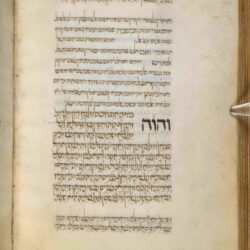
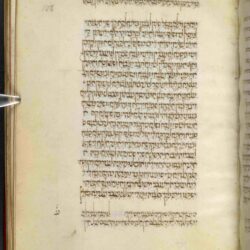
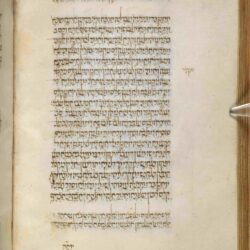
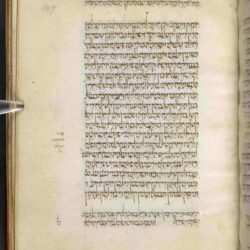
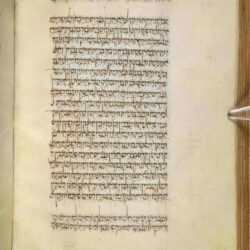
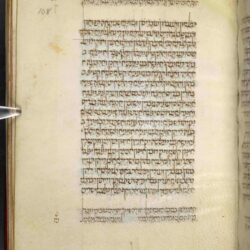
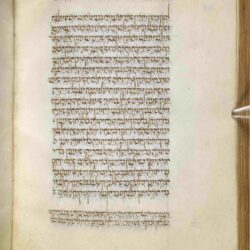
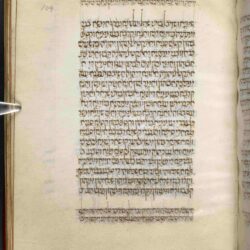
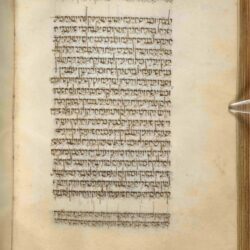
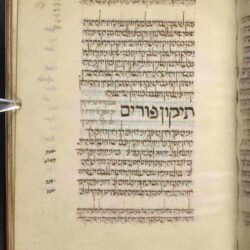
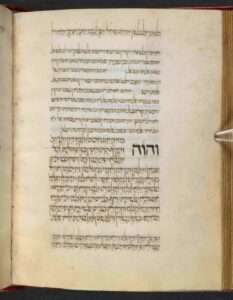

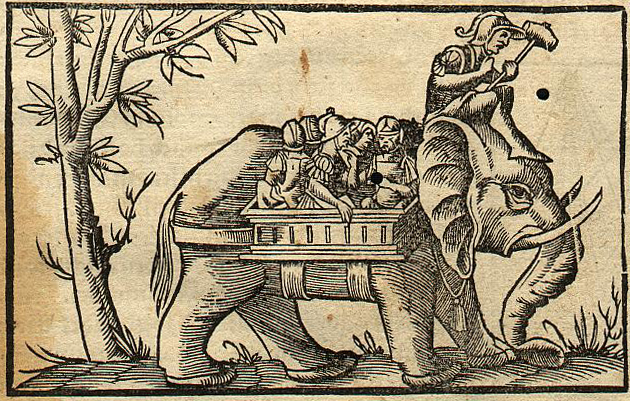







Leave a Reply